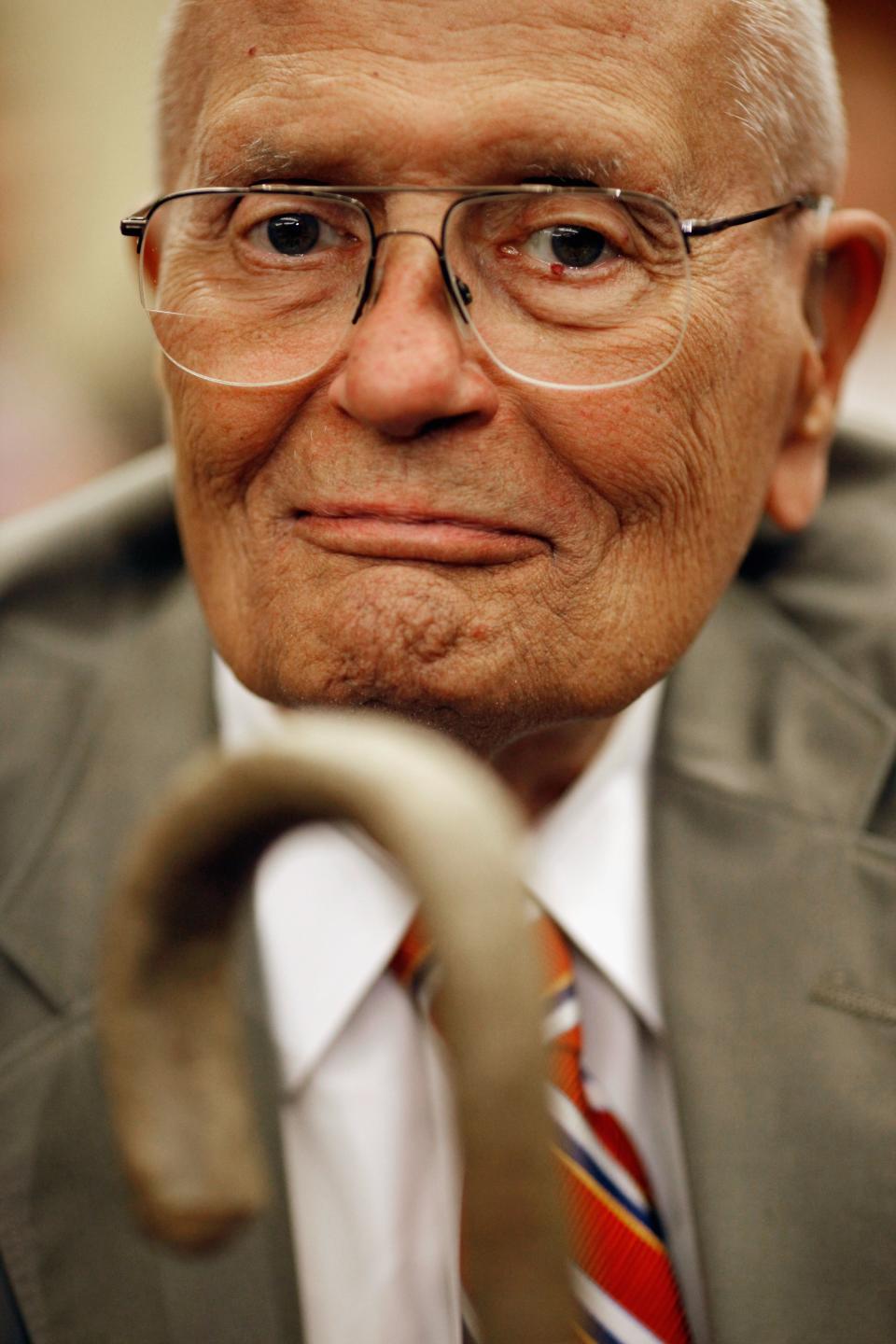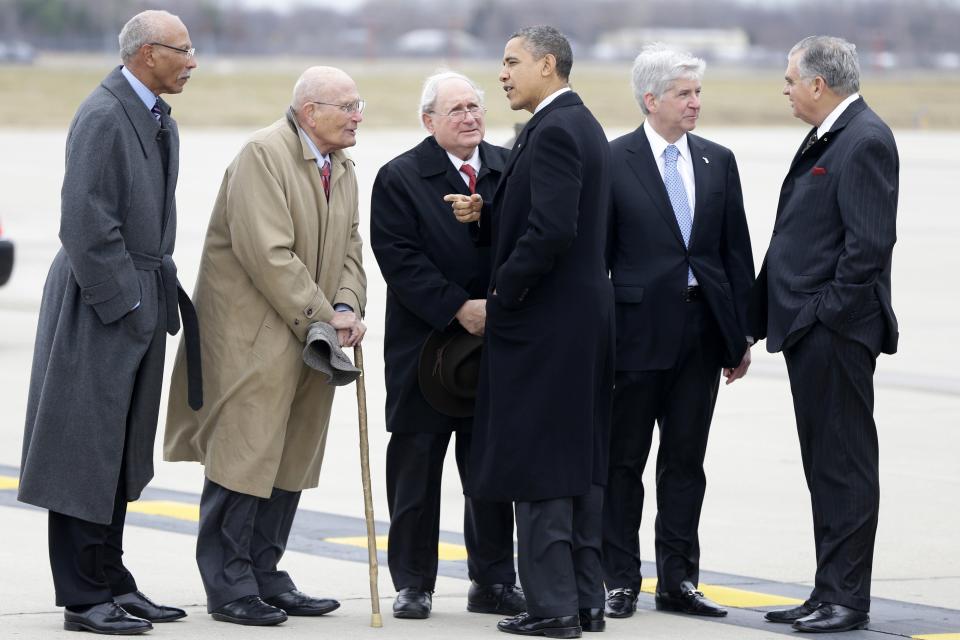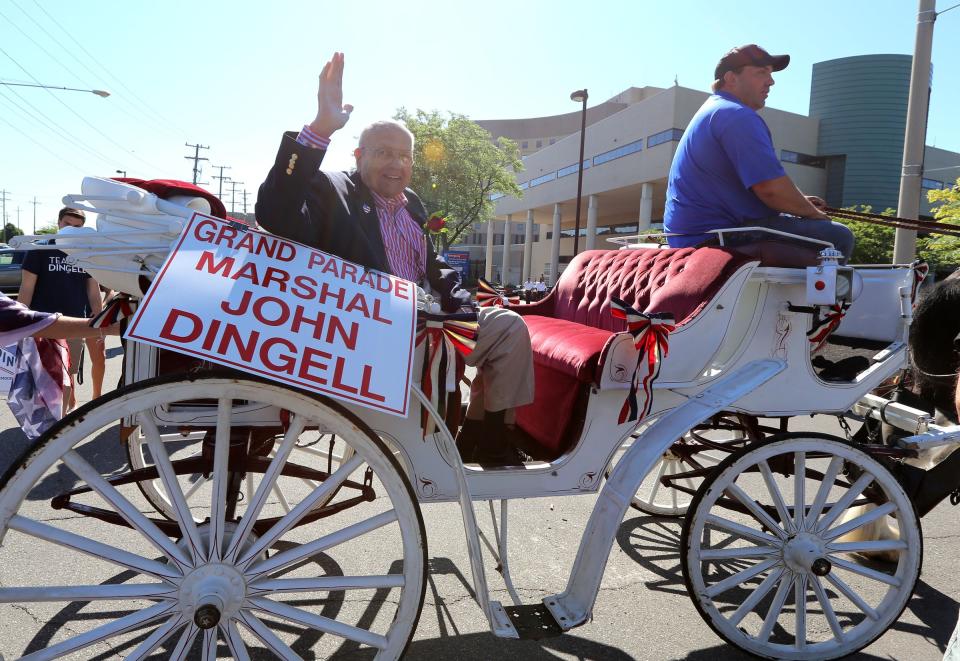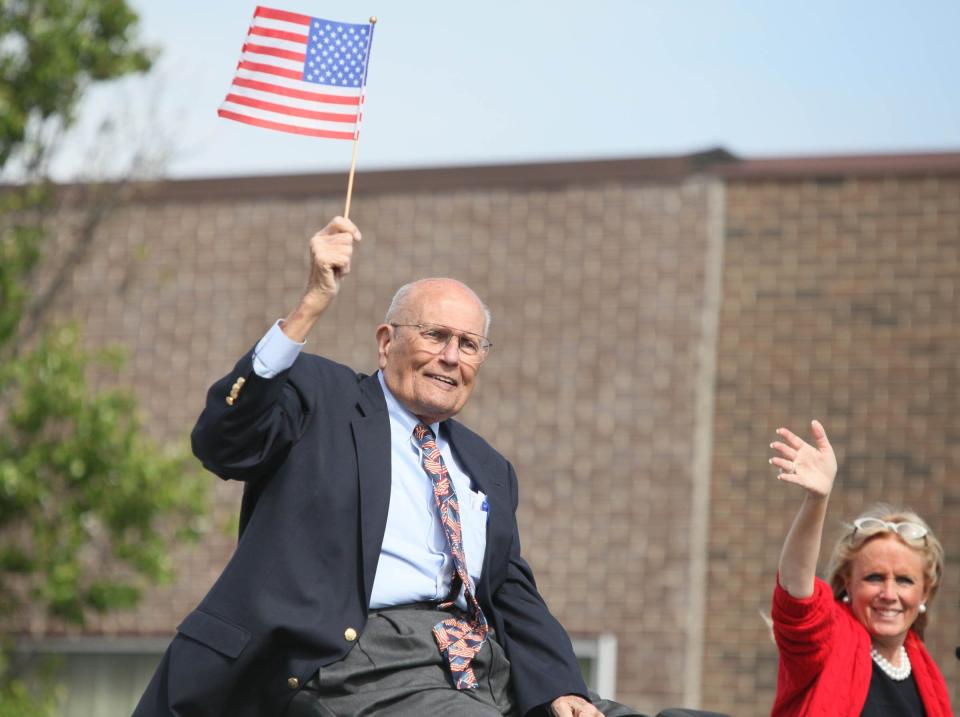Michigan's John Dingell, longest-serving member in Congress, dies at 92
Former U.S. Rep. John David Dingell Jr., who was one of the U.S. House’s most powerful chairmen and helped write and pass some of the most consequential legislation in the nation's history, died Thursday. He was 92.
Dingell, of Dearborn, served nearly 60 years in the House, making him the longest-serving member in Congress' history. He stepped down in early 2015. His wife, U.S. Rep. Debbie Dingell, confirmed his death for the Free Press at about 9:30 p.m.
"He was my love," she said, beginning to cry. She said he passed peacefully.
"He was talking to us and we were all laughing (just before he died)," she said, before becoming emotional and asking to get off the phone. Her office, shortly thereafter, put out a statement saying he died in their Dearborn home and will be remembered for "his decades of public service to the people of southeast Michigan, his razor-sharp wit, and a lifetime of dedication to improving the lives of all who walk this Earth.”
Dingell's death followed hospitalizations for various health problems in recent years. On Wednesday, sources close to his family and other reports said he had entered hospice with prostate cancer. That was after his wife, who replaced her husband in Congress, posted on social media that rather than being in Washington, she was "home with John and we have entered a new phase."
More: John Dingell was a Twitter superstar. Here are his greatest hits.

"He is my love and we have been a team for nearly 40 years. I will be taking each day as it comes," she said in the post. Five months earlier, in September 2018, Dingell had suffered a mild heart attack and was briefly hospitalized.
"Today the great state of Michigan said farewell to one of our greatest leaders," Gov. Gretchen Whitmer said in a statement as condolences from public officials began to pour in. "John Dingell will forever be remembered as ‘The Dean’ of Congress not simply for the length of his service, but for his unparalleled record of legislative accomplishments."
House Speaker Nancy Pelosi, D-Calif., who occasionally sparred with John Dingell, in the past, put out a statement saying, "Today, we have lost a beloved pillar of the Congress and one of the greatest legislators in American history. ... Chairman Dingell was our distinguished dean and Chairman, our legendary colleague and a beloved friend. His memory will stand as an inspiration."
Arrangements for Dingell's funeral were not immediately released.
Known in Washington and metro Detroit as Big John or “the truck” for his hard-charging personality, Dingell was an iconic presence in both.
An erudite, gentlemanly presence, Dingell, in his heyday atop the House Energy and Commerce Committee, brimmed with self-confidence and legislative savvy. At 6-foot-3, he towered over witnesses and was as feared and revered as any member of Congress. Throughout his career, he remained an advocate of Michigan manufacturing, its signature auto industry and its natural resources.
After retiring at age 88, Dingell surprisingly embraced Twitter, reveling in the brevity of the form. He had more than 258,000 followers as he made playful, often sarcastic comments on culture (“Staff has now informed me of what a Kardashian is. I'm only left with more questions”), Michigan sports (“Say what you will about the Lions, they've nearly perfected walking backward between plays while the flags are being picked up”) and politics.
Following the conflict in Charlottesville, Va., in 2017 in which white nationalists brawled with protesters wanting to pull down a statue of Confederate Gen. Robert E. Lee — after which President Donald Trump said there were “very fine people” on both sides — Dingell tweeted, “I signed up to fight Nazis 73 years ago and I'll do it again if I have to.”
On Wednesday, he dictated his last tweet to his wife, saying, "The Lovely Deborah is insisting I rest and stay off here, but after long negotiations we've worked out a deal where she'll keep up with Twitter for me as I dictate the messages. I want to thank you all for your incredibly kind words and prayers. You're not done with me just yet."
He will always be known first and foremost, however, for a remarkable legislative tenure that lasted 59 years — spanning all or part of 11 presidencies — during which time he cast tens of thousands of votes and helped write or otherwise played a role in passing the most significant measures of the era, including Medicare, the Civil Rights Act, the Clean Water and Clean Air acts, the Endangered Species Act and more.

In 2010, he helped pass the Affordable Care Act, modeled in part on legislation dating to that first proposed by his father, a New Deal Democrat whose career the younger Dingell set out to model his own on — and ended up surpassing.
“One of the most consequential members of Congress in the last century" is how congressional scholar Norm Ornstein described Dingell, noting he had a hand in “virtually every major social policy advance” since the 1960s. He was mentioned alongside congressional giants such as House Speakers Sam Rayburn and Tip O’Neill, as well as the late Sen. Robert Byrd, whom Dingell surpassed as the longest-serving member in 2013.
He referred to himself as “just a dumb Polish lawyer” — the family name was altered from Dzieglewicz — but such self-appraisal beggared the facts: For decades, Dingell was considered among the most effective members of Congress in terms of working his will and wasn’t afraid to take on presidents, Cabinet officials, industrialists or even leaders of his own party to do so.
More: John Dingell recalled as icon: Here's what colleagues, friends are saying
He was not beloved by all. Some environmentalists considered him too close to the auto industry and an enemy to anti-pollution efforts, but he was still praised as a conservationist. For decades, he ran counter to his party’s policy and defended gun rights, even sitting for a time on the National Rifle Association’s board, but he was also an advocate for policies to help society’s most vulnerable citizens. Some who ran afoul of him considered him ruthless and arrogant, a bully; his many friends and allies — Democrat and Republican — described him as generous, trustworthy and loyal.
Dingell joined Congress as a Democrat in a post-war era when that party's dominance in the House was a given and survived to see the institution he loved crippled by partisan factions and an intransigence that he loathed. His own career saw him expand exponentially the scope of the Commerce Committee and lead oversight efforts that would see the breakup of AT&T and run several Reagan-era officials out of office.
Even at the end, Dingell — having lost his committee chairmanship to a challenge in his own party and bent by age and injury — continued to employ an encyclopedic knowledge of legislative processes and a lifetime of relationships on both sides of the political aisle to help shape legislation, including pipeline regulations and food safety protections. Even after Republicans regained majority control in 2011, he remained a force to contend with as “chairman emeritus” — and a longtime friend of the chairman who succeeded him for a time, U.S. Rep. Fred Upton, R-St. Joseph.

In his Dearborn-based district, Dingell’s presence was felt in terms of innumerable earmarks and funding for rail lines and stations, new roads and bridges, airport improvements, educational facilities and much more. He put together land deals and federal authorizations to help create the Detroit River International Wildlife Refuge and the River Raisin National Battlefield Park. He helped arrange federal support for Detroit during its bankruptcy and played a role in getting federal aid to GM and Chrysler.
A few years ago when Ann Arbor desperately needed financial help to replace a crumbling bridge, he placed a call to then-Transportation Secretary Ray LaHood, an old friend, to help secure funding.
Despite his name recognition, political savvy and long list of friends, however, he was never seriously tempted to pursue higher office.
“I never wanted any other job,” Dingell told the Free Press in 2013 on the verge of surpassing Byrd as the longest-serving member ever. “I’m one of the luckiest guys in shoe leather.”
Dingell seemed destined for Congress
Born on July 8, 1926, in Colorado Springs, Colorado, Dingell spent much of his formative years in Washington, D.C. His father, who had ties to organized labor, moved the family back to Detroit and won election to a newly created congressional district in 1933. Despite redistricting, changes in political fortunes and Michigan’s loss of seats through the years, the state has had a Dingell representing it since that time.
John David Dingell Jr. served as a House page and attended schools in the Washington area before going to Georgetown University, where he got a law degree. In 1944, he was drafted, rose to the rank of second lieutenant and was about to be sent on a planned Japanese invasion when it was preempted by the U.S. dropping atomic bombs on Hiroshima and Nagasaki.
After the war, he entered private practice in Detroit, before joining the staff of U.S. Circuit Judge Theodore Levin and then becoming an assistant prosecuting attorney for Wayne County. After his father died in 1955, Dingell was elected in a special election to replace him. As he was sworn in by Rayburn, and other members gave remembrances of his father, it was difficult for him not to burst into tears.
He was 29 years old.
In the years that would follow, Dingell would learn from Rayburn, Speaker John McCormack and others how to legislate, build coalitions and master parliamentary rules, taking key roles on committees and amassing legislative acumen. In 1991, U.S. News and World Report named him one of its “National Heroes,” calling him Congress’ most feared Democrat. In 1994, at the height of his powers, the Almanac of American Politics described Dingell as “by any measure … one of the big men of the House.”
Taking control of what would from then on be known as the Energy and Commerce Committee in 1981 — a time when powerful committee chairs still virtually ruled Congress — he expanded its reach to cover pollution, securities, telecommunications, energy, railroads, toys, defense contracting, auto regulations, consumer protection and more. It was a job he would hold onto for an uninterrupted 14 years.
Some 40 percent of all legislation went through the committee, more than any other, and Dingell kept a photo of the Earth from space near his office desk so that if anyone asked the limits of the committee’s jurisdiction, he could point to it.
As chairman of the Oversight and Investigations Subcommittee — a position he held onto for a time after becoming full committee chair — Dingell continued a practice of calling recalcitrant business people and errant bureaucrats before him to pepper them with questions. He investigated the Environmental Protection Agency, the Food and Drug Administration and oversaw the sale of Conrail; it was his committee that learned the Pentagon was spending $640 each for toilet seats. His letters to agency officials — often demanding specific answers to questions in a tight time frame — grew legendary in Washington as “Dingell-grams.”
More: Flashback: Trump meets match in 'tweet king' John Dingell
“He was a watchdog over the government par excellence,” Don Wolfensberger, a congressional scholar at the Bipartisan Policy Center in Washington, said in 2014, shortly after Dingell announced his impending retirement. “He went hard and fast after the answers to a lot of questions about how the agencies were run.”
His skill and doggedness was such that presidents and congressional leaders often tried to get around him — with varying degrees of success. Many embraced him instead. Dingell was considered in such high esteem, for instance, that it was said that President Bill Clinton chose a former UAW staffer as his chief congressional liaison just to keep the lines of communication open with Dingell.
He was credited with developing a staff as aggressive and demanding as he was and they remained devoutly loyal to him through the years. One chief of staff of his remembered his interests as so varied and deep that he could “describe a Russian ballet, or he could tell you how to gut an elk without getting any blood above the second knuckle.”
Meanwhile, he had few political challenges at home. In 1964, he squared off in a redrawn district against another incumbent — John Lesinski Jr., also the son of a former congressman — in what was seen as a referendum on the Civil Rights Act. Dingell had voted for it; Lesinski was the only northern Democrat to vote against it. Dingell, with the help of labor, won.
In 2002, Dingell was placed in the same district as Rep. Lynn Rivers and it led to a hard-fought, fractious race. Dingell won, and, when Democrats took back the majority in the House in 2006, he again became chairman of the Energy and Commerce Committee. It was short-lived, however — two years later, with Dingell recovering from knee surgery, an ally of Speaker Nancy Pelosi — Rep. Henry Waxman of California, a legislative legend in his own right whose work with Dingell helped write Clean Air Act standards — challenged him for the chairmanship and won.
Many thought Dingell would leave after that but he stayed — helping to pass the Affordable Care Act in 2010 and taking on angry constituents in town hall meetings to explain it and winning two more terms before calling it quits.
A power couple in Washington and Michigan

He referred to his wife Debbie — “the lovely Deborah,” he called her in public — as his “secret weapon.” For decades, they were one of Washington and Michigan’s premier political power couples with connections that stretched from industry and labor through the halls of Congress to the White House.
More than 26 years his junior, the former Deborah Insley notably only agreed to go out with the divorced Dingell — he had four children from his first marriage — after he asked several times. Married in 1981, he doted on her and she proved a political power in her own right, guarding his back with pundits — though not always agreeing with him, such as on gun rights — and becoming a Democratic national committeewoman before she was a member of Congress.
When he announced his retirement, no one was surprised that Debbie Dingell, who had also been talked about as a possible contender when U.S. Sen. Carl Levin announced his impending retirement in 2013, said she would run to fill her husband’s seat, which no one other than someone with the last name Dingell has ever held.

Dingell’s retirement came as a host of Michigan politicians were headed for the exits: Levin, a Democrat, as well as Ways and Means Chairman Dave Camp, R-Midland, and Intelligence Chairman Mike Rogers, R-Howell. With Dingell’s departure, a former staffer of his — U.S. Rep. John Conyers, of Detroit — became the longest-serving acting member of Congress, having been first elected in 1964.
Conyers' chances of catching Dingell and surpassing his longevity in Congress disappeared in December 2017 when Conyers stepped down amid allegations he had harassed and otherwise mistreated women staffers, accusations the congressman denied.
Dingell’s service stretched back to a time when there were just 48 stars on the American flag, before Alaska and Hawaii had been admitted as states. And the fact that he remained an integral member of the House all those years amazed many.
“Dingell is, just deep in his bones, a man of the House,” remembered Ornstein, who had known Dingell for decades, around the time of his retirement. “He loves the House, the rhythms of the House. He loves to represent people. He loves to get his fingers into policy.”
Added Wolfensberger: “I’m not saying there’s a gene there, but it’s pretty close, considering he succeeded his father. There’s something there that sets him apart from most people.”
In 2014, Dingell was awarded the Presidential Medal of Freedom by then-President Barack Obama.
In recent years, Dingell had suffered health problems, though typically they involved relatively short stays in the hospital. Shortly after announcing his retirement plans, Dingell had a medical procedure done to correct an abnormal heart rhythm, then returned to work — finishing out his term in January 2015 — after that. Around the time of his retirement, in late 2014, he also took a couple of falls that landed him in the hospital, including one in which he fractured his hip, even as his wife was preparing to take office.
He got a pacemaker in 2015 — after which the former congressman tweeted, "Being old sucks." And in December 2017, he was hospitalized at George Washington University Hospital in Washington, D.C. after a fall, telling his Twitter followers, "Particularly glad I'm not a horse."
Dingell knew, prior to his retirement announcement in early 2014, that some critics thought it was time for him to leave before he did but he believed it was important to remain in office as long as he thought he could make a difference. When the end came, Dingell — who often employed homespun quips to make his point — didn’t mince words.
“I’ve reached the age when people don’t buy green bananas,” he joked in February 2014, making the official announcement before the Southern Wayne County Chamber of Commerce in Southgate. “And I don’t think that I can assure people that the green banana I buy today, I’m going to be around tomorrow to eat.”
“I want to serve honorably and well, and I want to do the job I can and should do, ” he added. “I don’t want people to feel sorry for me. .... I don’t want to go out feet first.”
Contact Todd Spangler: 703-854-8947 or tspangler@freepress.com. Follow him on Twitter at @tsspangler.
This article originally appeared on Detroit Free Press: Michigan's John Dingell, longest-serving member in Congress, dies at 92

